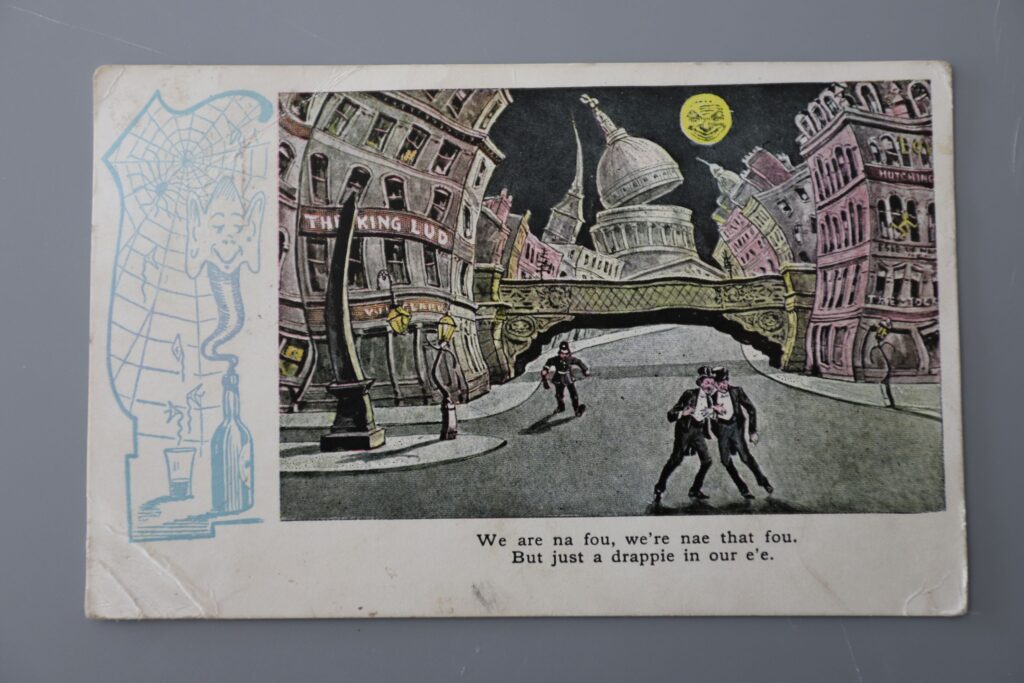Explore
Postcard
Postcard, colour cartoon featuring two drunk men in dinner suits on a city street, titled 'What the Moon Sees' addressed to Mickie Frost, Sixmilebridge, County Clare, Ireland, posted Kingston On Thames, 24 September 1904..

An album containing postcards that had been sent to Garna House, Sixmilebridge, by Georgina Frost, her siblings and friends. The cover has embossed on the front The ‘Cabinet’ post-card Album’, and is green in colour with slots for placing and holding postcards. An inscription inside the album reads: ‘To dearest Georgie/with much love/Sep1905’ or September 1905. Postcard, colour cartoon featuring two drunk men in dinner suits on a city street, titled ‘What the Moon Sees’ addressed to Mickie Frost, Sixmilebridge, County Clare, Ireland, posted Kingston On Thames, 24 September 1904. It refers to playing Hampsted Wanderers in ink, with the score written in pencil later: ‘We won by a goal and 3 tries’, signed Paddy.
Georgina “Georgie” Frost (29 December 1879 – 6 December 1939) was an Irish court official who was the first woman to hold public office in the United Kingdom of Great Britain and Ireland. She was born in Sixmilebridge, County Clare, on 29 December 1879, the daughter of Margaret Kett (1847-1888) and Thomas Frost (1842–1938). Thomas Frost was the petty sessions clerk for Sixmilebridge and Newmarket-on-Fergus.Frost’s maternal grandfather, Michael Kett, had held that role in Sixmilebridge in the early 1840s.
In the six years immediately before Thomas Frost’s retirement in 1915, Frost had assisted her father in his duties, often performing them herself. She became a well known figure in the area, travelling around by bicycle.
Upon his retirement, she was appointed to succeed him by the local magistrates. At this time, however, under the Petty Sessions Clerk (Ireland) Act 1881 this appointment had to receive final approval from the Lord Lieutenant, who rejected her appointment based on her gender. The Lord Lieutenant ordered the local magistrates to appoint another person to the position, but Frost remained the only applicant.
Following the objection of the Lord Lieutenant, the local magistrates granted Frost a temporary contract for one year in order to fight her case, but again this was rejected by the Lord Lieutenant,
Frost brought the case to the chancery division in Dublin. Mr Justice Dunbar Barton refused to usurp the power of the parliament in his judgement. He stated that women were not disqualified from such positions due to inability, but due to concerns around “decorum” and that the duties of the office could be “painful and exacting.” He then dismissed her claim.
Frost took her claim to the court of appeal before Lord Shandon, Lord Chief Justice Molony and Lord Justice Stephen Ronan. This appeal was heard in November 1917, with judgement reserved. In December 1918, when the judgement was delivered, Lord Shandon had resigned as Lord Chancellor, but left a letter instructing that the appeal was to be granted. Lord Shandon was satisfied that no statutes or supposed principles of the common law disallowed the appointment. Despite this, the other sitting judges sided with the wording of the statute which they viewed as excluding Frost from the office.
Her lawyer Tim Healy MP discovered that a judge, Lord Shaw, was amenable to the application of the Scottish practice which allowed for an appeal to be brought in forma pauperis. In this case, Frost would incur no legal costs if she failed in her appeal. She then brought her appeal to the House of Lords for a hearing on 27 April 1920. By this point the Sex Disqualification (Removal) Act 1919 was law, and removed the legal bar to her appointment. Frost was appointed in April 1920, thus making her the first woman to hold public office in the United Kingdom of Great Britain and Ireland.
Her appointment was short-lived, as in 1923 the Irish Free State abolished her job. However, those years were marked by the Irish Civil War, which saw Frost held at gunpoint by the IRA, saw the Newmarket-on-Fergus petty sessions court house destroyed, and a raid on the local RIC barracks.
Frost died on 6 December 1939 in at her home, Garna House, in Sixmilebridge.
Collection: Georgina Frost
Category: Communication Equipment